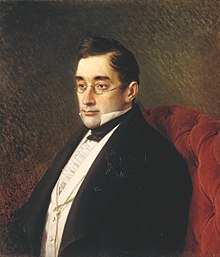Alexander Griboyedov | |
|---|---|
 Posthumous portrait (1873) by Ivan Kramskoi | |
| Russian Ambassador to Iran | |
| In office 1828[1]–1829 | |
| Monarch | Nicholas I of Russia |
| Personal details | |
| Born | Alexander Sergeyevich Griboyedov 4 January 1795 Moscow, Russian Empire |
| Died | 11 February 1829 (aged 34) Tehran, Qajar Iran |
| Resting place | Tbilisi, Georgia |
| Nationality | Russian |
| Spouse | Nino Chavchavadze |
| Alma mater | Imperial Moscow University (1808) |
| Occupation | Diplomat, playwright, poet, and composer |
| Signature | |
Alexander Sergeyevich Griboyedov (Russian: Александр Сергеевич Грибоедов, romanized: Aleksandr Sergeevich Griboedov; 15 January 1795 – 11 February 1829)[a] was a Russian diplomat, playwright, poet, and composer. His one notable work is the 1823 verse comedy Woe from Wit. He was Russia's ambassador to Qajar Persia, where he and all the embassy staff were massacred by an angry mob in the aftermath of the ratification of the Treaty of Turkmenchay (1828), which confirmed the cession to Russia of Persia's northern territories comprising Transcaucasia and parts of the North Caucasus. Griboyedov played a pivotal role in the ratification of the treaty. The immediate cause for the incident was Griboyedov giving refuge to an Armenians who had escaped from the harems of the Persian shah and his son.
- ^ Borrero, Mauricio (2009). Russia: A Reference Guide from the Renaissance to the Present. Infobase Publishing. p. 169. ISBN 978-0816074754.
- ^ Baynes, T. S.; Smith, W. R., eds. (1880). . Encyclopædia Britannica. Vol. 11 (9th ed.). New York: Charles Scribner's Sons.
Cite error: There are <ref group=lower-alpha> tags or {{efn}} templates on this page, but the references will not show without a {{reflist|group=lower-alpha}} template or {{notelist}} template (see the help page).